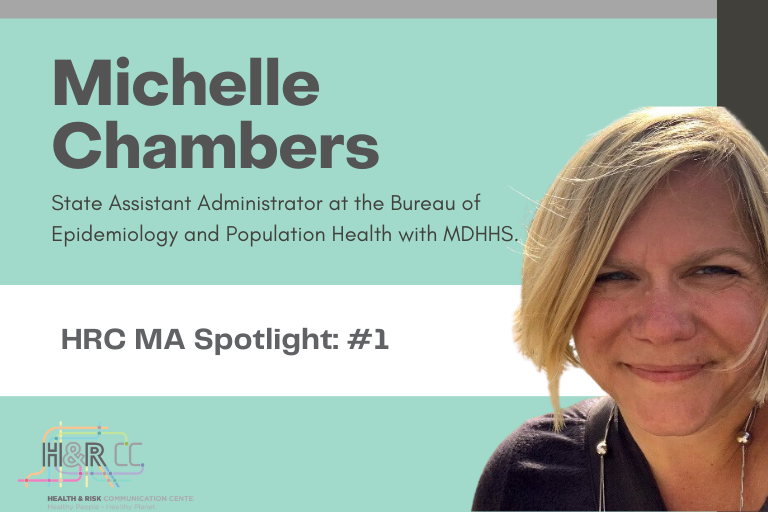In this post, we have the privilege to interview Michelle Chambers, who now serves as the State Assistant Administrator at the Bureau of Epidemiology and Population Health with the Michigan Department of Health and Human Services (MDHHS).
Q: Why did you pick the HRC MA program?
Michelle: It was actually a very happy accident! I had moved back to Michigan after working in public relations in New York for a couple years post-undergrad and getting a master’s degree wasn’t even on my radar. (Honestly, I’m not even sure at the time I knew what a master’s degree was, having been the first person in my family to even complete a bachelor's degree.) However, during my first performance review at the Michigan Department of Health and Human Services (MDHHS; then Michigan Department of Community Health) where I had gotten a job as a program assistant, my manager told me that she saw a lot of promise in me, but in order to move up in the area I was working, I really needed a master’s degree. So, I went home, pulled up the Michigan State University catalog, scanned for Communications (given my background in PR) and then saw Health Communications, and realized it would be a perfect fit. I reached out to the program lead (at the time Kami Silk) and she said they still had spots in the cohort, so I quickly signed up to take the GRE, filled out the application paperwork, and was in! The rest is history.
Q: How has it helped you?
Michelle: Having a master’s in health communication has helped me twofold: one, the understanding of models and theories when developing frameworks on which to build communication campaigns has been hugely helpful. It’s always easier to build when you have a foundation to stand on. Secondly, it gave me the credibility I needed to work as a social scientist in the scientific field of environmental health. I continue to work with toxicologists, epidemiologists, statisticians, chemists, biologists, engineers, and geologists on a daily basis – so having had the coursework in epidemiology and statistics that was required when I was in the program is very beneficial – as is the ability to speak confidently about what I know as a communicator and what I can bring to the table to help them share their important findings. I worked as a health educator within the Department for almost a decade before I moved into the more management-centric roles of late.
Q: What do you do now?
Michelle: After nearly 17 years working with the Division of Environmental Health at the Michigan Department of Health and Human Services (MDHHS) in myriad roles from Program Assistant to Health Educator to Deputy Division Director, I have recently accepted the position of State Assistant Administrator with the Bureau of Epidemiology and Population Health within MDHHS. In this role, I provide leadership support and organizational management for the three Divisions within the Bureau – Life course Epidemiology and Genomics; Vital Records and Health Statistics; and my old stomping grounds, Environmental Health. Having strong communication and critical thinking skills has definitely helped me in this position, even though development of health communications is no longer my day-to-day job.
Q: How did you get there?
Michelle: I showed up and worked hard. I was always willing to assist my team, problem solve, and tackle new challenges that came our way. Having strong communications skills, including the ability to write clearly and persuasively very much assisted the Division of Environmental Health in its growth as they went from primarily a grant-funded division of 40 to a division of about 300 and growing that is tackling some of Michigan’s largest environmental challenges, including lead, PFAS, and vapor intrusion issues throughout the state. I look forward to providing the same direction and leadership for the other two divisions in our bureau now!
Q: What info would you give to current students/new alumni?
Michelle: Always look for ways to be a team player – group projects are awful, to be sure, but they help you develop the critical skills you will need as you move into the workforce. Look for solutions, not problems. And always look for the easiest, most concise way to share the information you need to share. As I tell my colleagues, people already know you’re smart – you’re here – but using big words and convoluted sentences doesn’t help you convey knowledge – and that’s why we are here: to share what we know so people can make the best health decisions for themselves and their loved ones. Also, it helps to network and identify “back doors” into the organizations you want to work for. The CDC often uses contracting companies to bring in staff. MDHHS hires affiliate employees from the Michigan Public Health Institute (mphi.org/careers). Don’t get discouraged.
